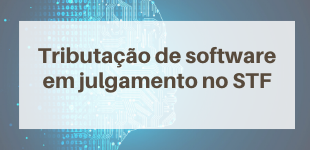
After more than two decades, the SFT decided to make a virtual judgment on Friday (04/17) the Direct Unconstitutionality Action (ADI) 1,945, through which the collection of ICMS, a state tax, on software made available via electronic transfer, such as download, streaming and cloud, is questioned. This decision surprised the entities representing the information technology sector, because the understanding that the states cannot tax these operations should be peaceful. During the evaluation, Minister Dias Toffoli asked to be seen at the trial, on 23/04. He reports ADIn 5659, which is part of the block of processes that deal with the subject in the Court, where RE 688.223, reporting by Minister Luiz Fux, is also being processed.
According to an assessment by ABES, in 2003, supplementary law to federal constitution No. 116 was enacted, determining that information technology services - including the development and licensing of software - should be taxed by the ISS - Tax on Services and expressly stating that the services listed, are not subject to ICMS. Complementary Law No. 157, sanctioned by the Federal Government at the end of 2016, expanded the list of activities taxed by the ISS (Services Tax), including modalities such as: streaming and cloud computing (storage and/or hosting of applications and systems information), among others. These two norms have sufficient scope to eliminate the "tax war" between municipalities and states, establishing who has the competence to levy taxes in relation to information technology services.
access the new signed and publicized manifesto on 22/04/2020, the sector entities made public an appeal for the STF to bring the ADI 1945/99 to trial in person. It is not yet known when this judgment will be resumed in the Court.
Risk of double taxation and legal uncertainty
In the opinion of ABES, the aforementioned Direct Action of Unconstitutionality should not have been included in the agenda of an isolated judgment by the STF and, at best, should be considered together with other more recent actions of the same type, which are pending in the court regarding this same question.
Another point that deserves questioning is the timeliness of the judgment at this time, knowing that tax reform proposals are currently being processed in Congress, which propose the unification of various taxes, including ISS and ICMS, with which the tax war should disappear between States and Municipalities regarding tax competences.
The legal advisors of entities in the information technology sector also raise the type of judgment defined by the STF. The action will be appreciated in a virtual session, a system in which the Rapporteur minister makes his vote and report available, and the other ministers have up to five days to express their vote and arguments, also in the electronic environment. It is evident that this mechanism removes the opportunity for debate, which takes place in face-to-face trials and in plenary sessions by videoconference, in which all interested parties and "amicus" (friends of the case) can present their arguments, hold oral arguments and dialogue with the justices during the trial.
Thus, the decision by the Supreme Court in this ADI, after the resumption of the judgment, could disrupt an IT sector, which has a fundamental role in the economic and social development of Brazil and which is gaining more prominence every day, especially now in the face of the global pandemic.














